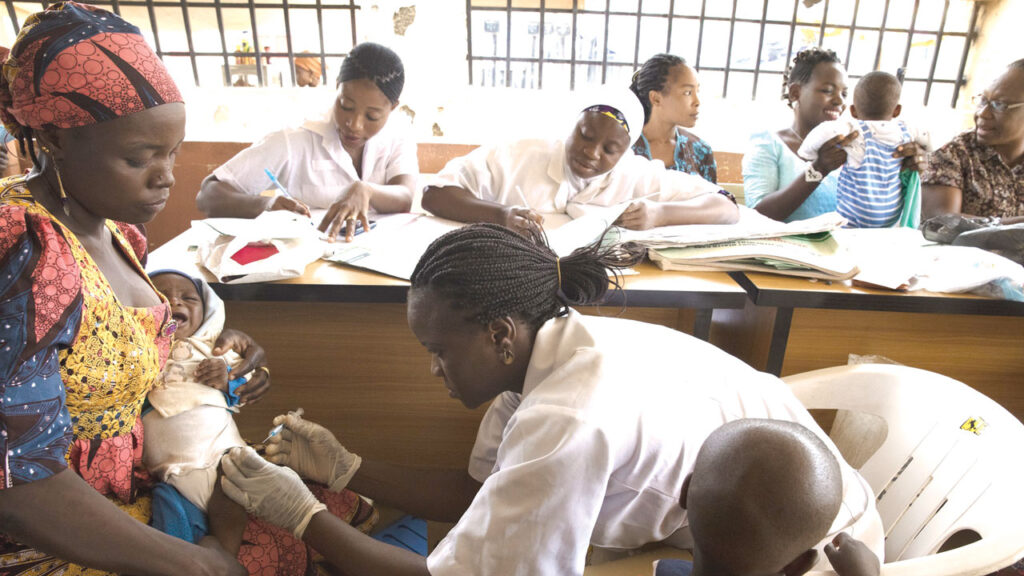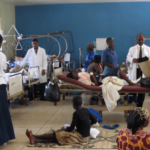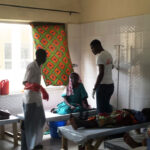
• 4.5 Billion People Not Fully Covered By Essential Health Services
• $328 Billion Needed Every Year Globally To Scale Up Primary Health Care In Low, Middle-Income Countries
• Stakeholders Decry Nigeria’s Poor Health Indices, Urge Govt To Implement 2001 Abuja Declaration, Strengthen Primary Healthcare
The World Health Organisation has said the right to health of millions is increasingly coming under threat around the world, warning that diseases and disasters loom large and would cause deaths and disabilities.
Every year, April 7, is celebrated as World Health Day and each year draws attention to a specific health topic of concern to people all over the world.
According to the Global Health Body, about 4.5 billion people representing more than half of the world’s population, are not fully covered by essential health services while 2 billion people face financial hardship owing to out-of-pocket health spending.
Consequently, the WHO has said that an additional $328 Billion is needed every year globally to scale up primary health care in low- and middle-income countries representing 3.3 per cent of national forecast GDP) and called on member countries to invest in health like their bottom line depends on it.
While calling on individuals globally to protect their right to health as a basic human right, the global health body insists that everyone should have access to the health services they need when and where they need them, without facing financial hardship.
Health, according to WHO, is defined as being “a state of complete physical, mental and social well-being and not merely the absence of disease or infirmity.”
Staying healthy as a young person and growing into a healthy old age is very important and starts from the day we were conceived.
To mark the World Health Day 2024, the global health body chose the theme ‘My health, my right’ to champion the right of everyone, everywhere to have access to quality health services, education, and information, as well as safe drinking water, clean air, good nutrition, quality housing, decent working and environmental conditions, and freedom from discrimination.
Meanwhile, stakeholders in the health sector have decried Nigeria’s poor health indices and called on the Federal Government to implement the 2001 Abuja declaration that pledged to allocate at least 15 per cent of the yearly national budget to the health sector.
They also urged the government to revamp the Primary Healthcare Centers across the country and make them functional.
Speaking with The Guardian in Abuja, the Executive Director of the Civil Society Advocacy and Legislative Centre, Musa Rafsanjani, argued that while the right to health exists on paper, there are challenges in fully realising it for all Nigerians and these include factors like limited access to healthcare facilities, affordability of treatment, and unequal distribution of resources.
Rafsanjani pointed out that Nigeria is facing challenges in achieving true universal health coverage (UHC), where everyone gets the healthcare, they need without financial burden.
He noted that Nigeria is a party to several international treaties that guarantee the right to health, including the African Charter on Human and Peoples’ Rights.
According to him, the right to health is enshrined in the African Charter on Human and Peoples’ Rights (ACHPR). Article 16 of the charter guarantees “every individual shall have the right to enjoy the best attainable state of physical and mental health adding that the ACHPR places a responsibility on member states to take all necessary measures to: Protect the health of their populations; and ensure people receive medical attention when needed.
He said, “at the national level, the Nigerian Constitution itself, under Chapter 2, acknowledges the right to health. While Chapter 2 doesn’t directly guarantee the right to health, it does establish a framework for the government to work towards a society where everyone has access to healthcare.”
He suggested that to guarantee health as a right for all Nigerians, the government in-line with the Maputo declaration should allocate 15 per cent of the total national budget to health to allow for building and equipping more hospitals and clinics, especially in rural areas, hiring and training more healthcare workers and investing in preventive care programmes.
Rafsanjani stressed the need for government to strengthen the implementation of existing initiative aimed to improve primary healthcare at the local government level and also strengthen the Basic Health Provision Fund (BHCPF) to ensure wider coverage.
He said that the National Health Insurance Authority Act (NHIA Act) of 2022 has been in effect for almost two years, adding that it represents a significant step towards universal health coverage in Nigeria. Rafsanjani, however, observed that a well-designed national health insurance should cover a significant portion of medical expenses for all citizens but a large percentage of informal sector are not enrolled on the programme.
He said, “there are implementation hurdles because rolling out a mandatory programme for a large and diverse population like Nigeria presents significant logistical challenges. While the Act mandates enrollment, ensuring affordable premiums and accessible healthcare services for everyone remains a hurdle. Also, effectively enrolling informal workers with irregular incomes and limited access to formal systems requires innovative solutions. There is need to simplify the enrollment process, particularly, for informal sector workers. On this World Health Day, my appeal to the Nigerian government would focus on two key areas: Strengthening Implementation of the NHIA Act: Prioritise Enrollment: Develop efficient and accessible enrollment mechanisms, particularly for the informal sector to ensure wider coverage.
“Government should allocate more resources to the healthcare system, focusing on building and equipping facilities, especially in underserved areas, and hiring more healthcare workers. Enhance Affordability: Government should explore various options like subsidies or flexible premium structures to make health insurance truly accessible for all Nigerians. Government should invest in Preventive Care, invest in strengthening the primary healthcare system to provide accessible and affordable preventive care services at the community level,” he said.
Also speaking, the Chairperson of the Health Sector Reform Coalition and the Chief Executive Officer of the Vaccine Network for Disease Control, Chika Offor, appealed to the Federal Government to ensure affordable and accessible health care for all Nigerians.
She urged government to strengthen the PHCs to enable the poor and the vulnerable to have access to health care and also provide health insurance for all Nigerians.
Offor said government should strengthen the health space and states should support the Federal Government to ensure that there is health for all Nigerians. Health for all Nigerians should truly be health for all Nigerians and it is the task of the Primary Health Care Centres (PHCs). PHCs are the bedrock of any formidable healthcare system and it is through access to functional PHCs that the rights of every citizen to health can be guaranteed.”
She continued, “without insurance, this cannot be possible insurance is between 10,000-15,000 depending on the state but if the PHCs are not do not have the capacity to receive these vulnerable Nigerians, they cannot, strengthen the health centres so that insurance can work.”
To mark the 2024 Health Day, the WHO urged governments to legislate as a way to realise the right to health across the full range of sectors including tax on tobacco, sugar, and alcohol, eliminate trans fats; reduce amount of antimicrobials in the agri-food system by 30-50 per cent by 2030.
It said, “the WHO Council on the Economics of Health for All has found that at least 140 countries recognise health as a human right in their constitution. Yet countries are not passing and putting into practice laws to ensure their population are entitled to access health services. This underpins the fact that at least 4.5 billion people — more than half of the world’s population — were not fully covered by essential health services in 2021.”
The organisation pointed out that every individual has the right to safe and quality care, without any discrimination.
privacy and confidentiality of your health information, information about their treatment and to informed consent, bodily autonomy and integrity.
The global health body also stressed the need to stop fossil fuel subsidies and subsidise or exempt tax of clean energy and fuels such as solar-, hydro- and wind-based electricity.
Justice: prohibit all forms of discrimination.
Transport: build up cycling infrastructure, support pedestrianisation.
According to the organisation, the burning of fossil fuels is simultaneously driving the climate crisis and taking away our right to breathe clean air, with indoor and outdoor air pollution claiming a life every five second.
WHO called on political leaders to join health communities demanding action, participate in petitions and discussions and promote the right to health as an intrinsic pillar of our broader human rights.
“Respecting our right to health means respecting our rights to access safe drinking water, clean air, good nutrition, quality housing, decent working conditions, and freedom from violence and discrimination. Governments should ensure decent work, worker rights and protections, and create fair, equal and gender-responsive working conditions for health and care workers, deliver on the right to health: make health services available, accessible, acceptable and of good quality for everyone, everywhere and be strategic and build from the basics: reorient health systems around primary health care.”
WHO also emphasised the need to ensure access to social protection such as health-care protection, pensions and unemployment benefits to reduce households’ vulnerability to poverty and counteract the negative impacts of unexpected life events on income, wealth or health.
“Know the health needs of populations and act on them: collect, analyse, use and monitor data, disaggregate by age, sex, economic status, education level, place of residence, race and ethnicity, and other characteristics and act to correct health inequities. Safeguard the right to health in war and conflict: protect health infrastructure and health workers and ensure uninterrupted access to health services, in adherence to international humanitarian and human rights law,” it added.













